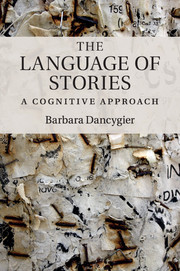Book contents
- Frontmatter
- Contents
- Figures
- Acknowledgements
- Introduction
- 1 Language and literary narratives
- 2 Blending, narrative spaces, and the emergent story
- 3 Stories and their tellers
- 4 Viewpoint
- 5 Referential expressions and narrative spaces
- 6 Fictional minds and embodiment in drama and fiction
- 7 Speech and thought in the narrative
- 8 Stories in the mind
- Notes to the text
- References
- Literary works cited
- Index
8 - Stories in the mind
Published online by Cambridge University Press: 05 November 2011
- Frontmatter
- Contents
- Figures
- Acknowledgements
- Introduction
- 1 Language and literary narratives
- 2 Blending, narrative spaces, and the emergent story
- 3 Stories and their tellers
- 4 Viewpoint
- 5 Referential expressions and narrative spaces
- 6 Fictional minds and embodiment in drama and fiction
- 7 Speech and thought in the narrative
- 8 Stories in the mind
- Notes to the text
- References
- Literary works cited
- Index
Summary
Life is a trace in the ocean of stories.
The analyses and theoretical constructs proposed throughout this book apply to some of the more common questions raised by fictional narratives, but there is a host of more specific problems which can gradually be addressed. In this chapter, I will sum up some of the main directions the examples considered suggest and outline the general conclusions emerging.
The linguistics of literature
Stories are linguistic artifacts, but they require a language theory which allows the analyst to consider questions of meaning and form in some correlation, and deal with patterns of emergent interpretations. The primary interest of cognitive linguistics is the elucidation of form–meaning mappings and the uncovering of underlying cognitive concepts, and thus it seemed worthwhile to test it in a broad literary perspective. In the narrative context, where forms are less naturally in focus and meanings are of primary interest to readers and analysts alike, cognitive linguistics opens new avenues of investigation, with respect to both form and meaning.
- Type
- Chapter
- Information
- The Language of StoriesA Cognitive Approach, pp. 195 - 204Publisher: Cambridge University PressPrint publication year: 2011

